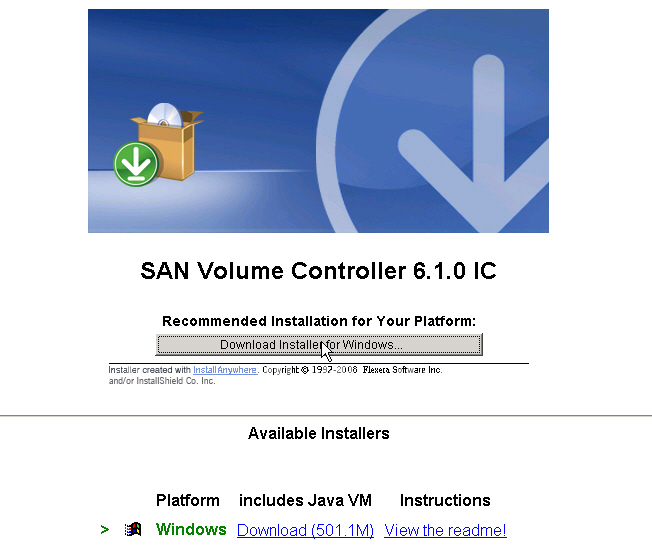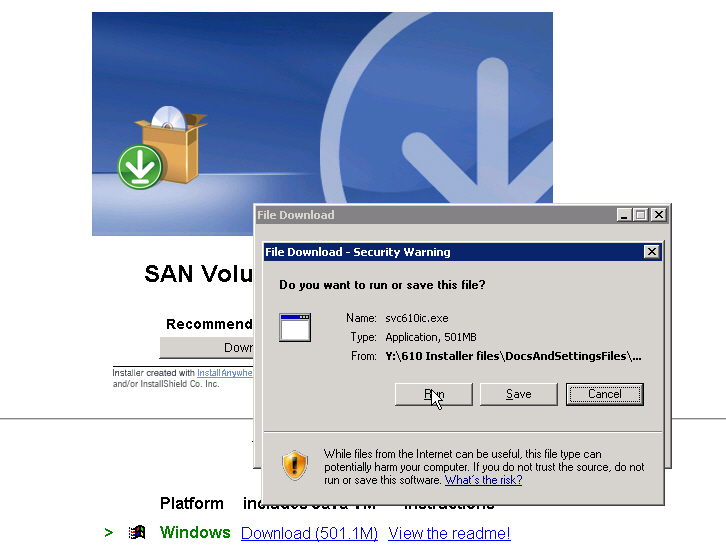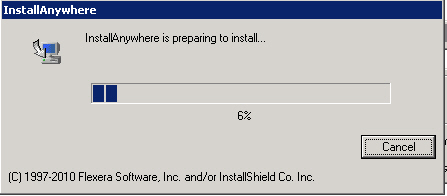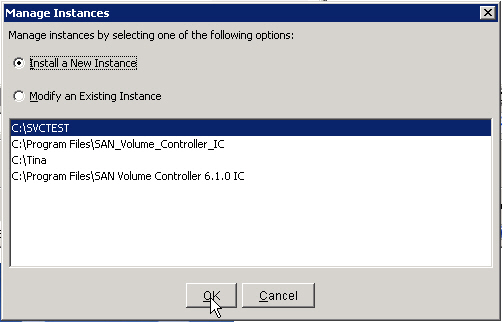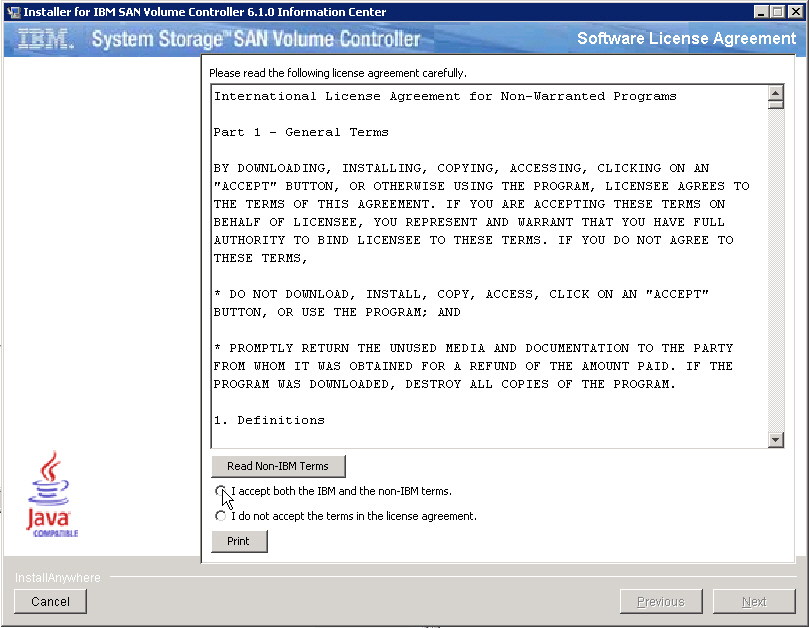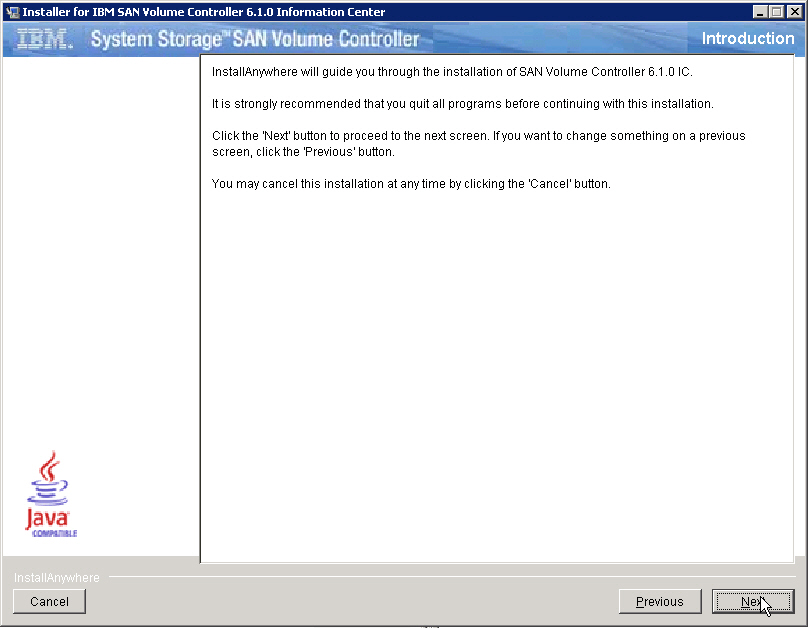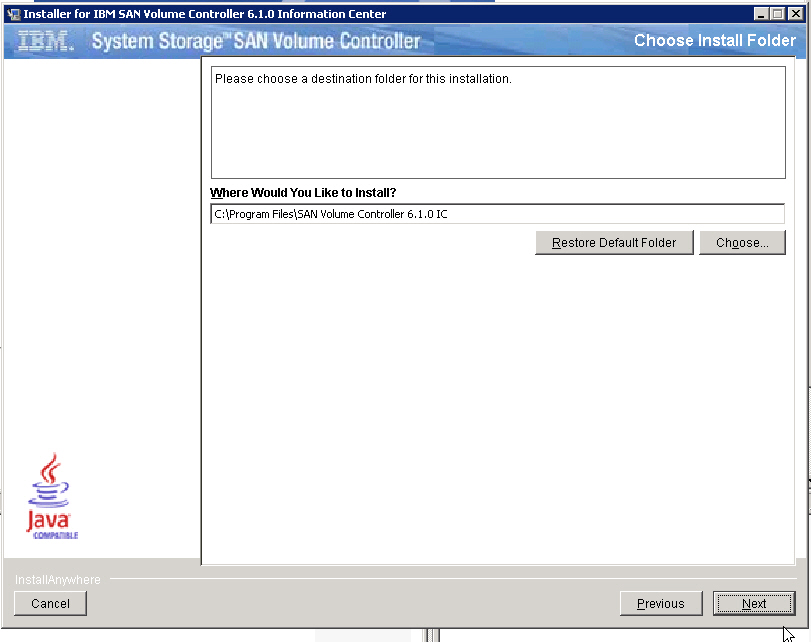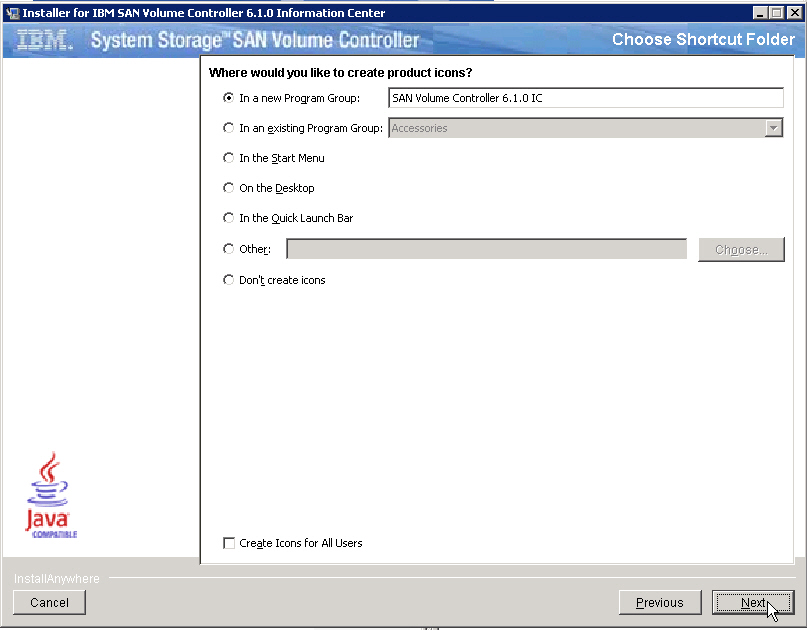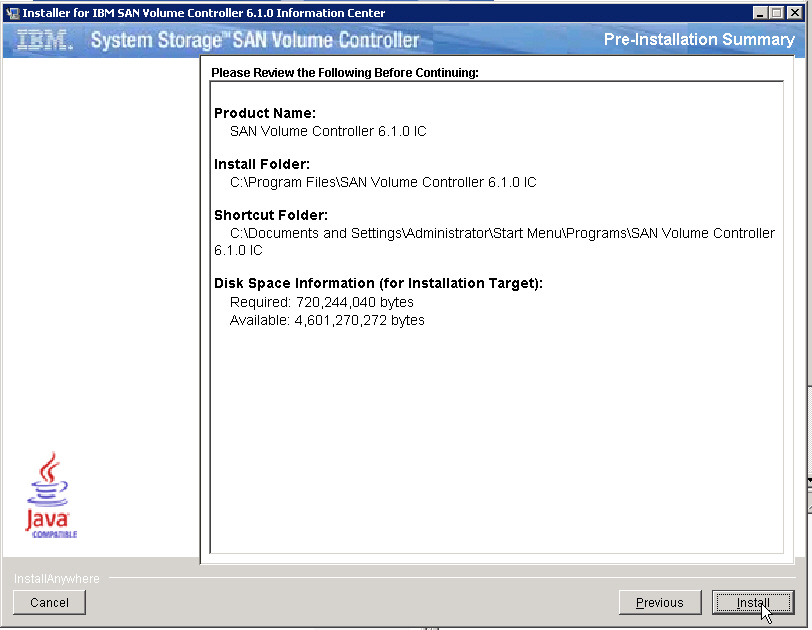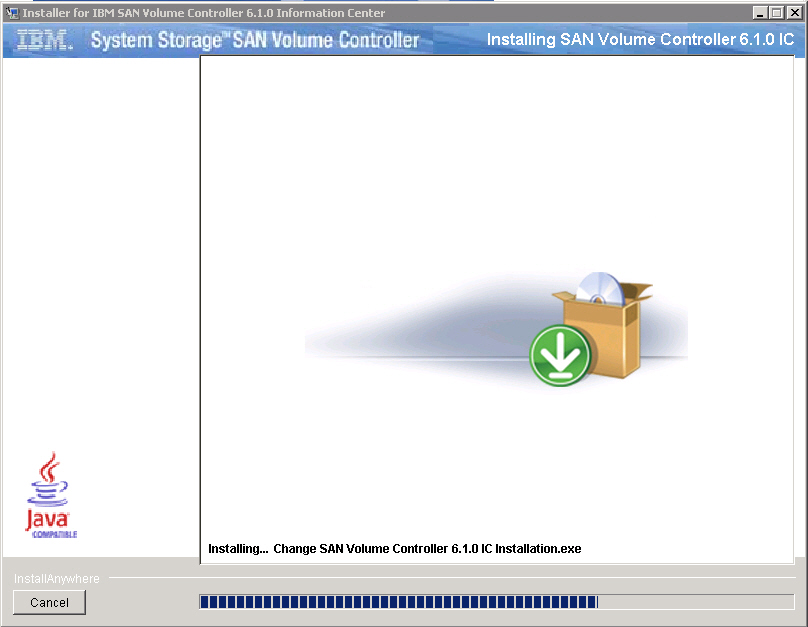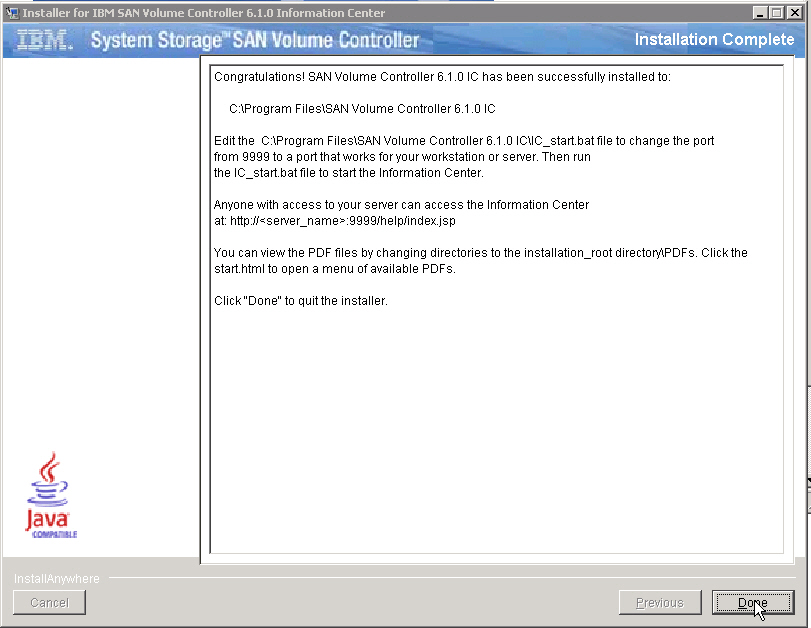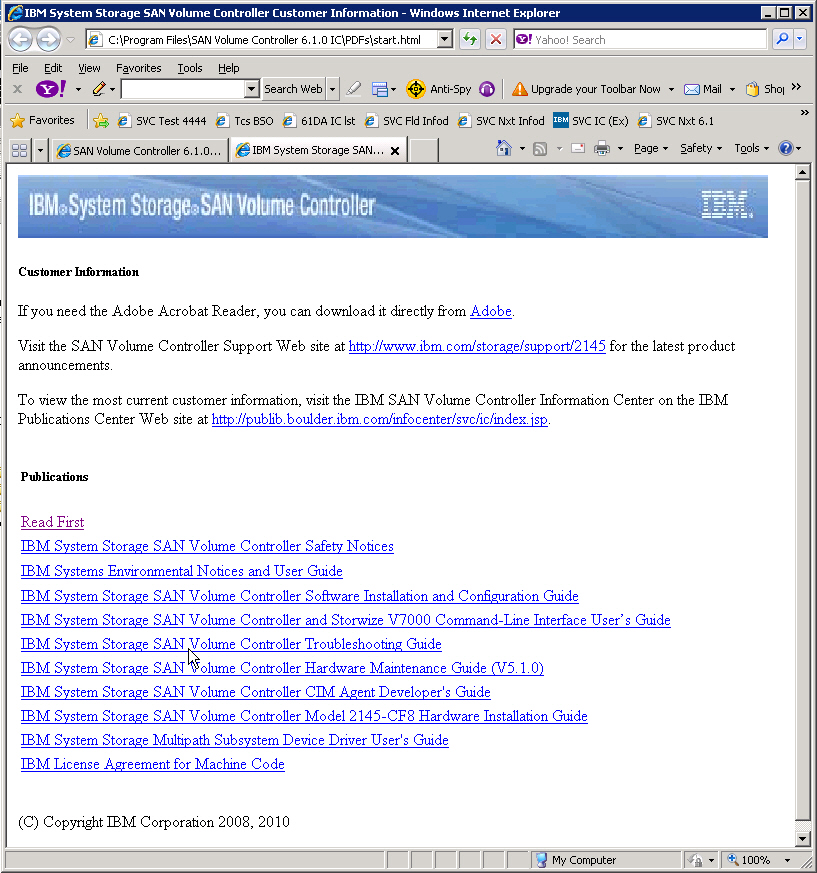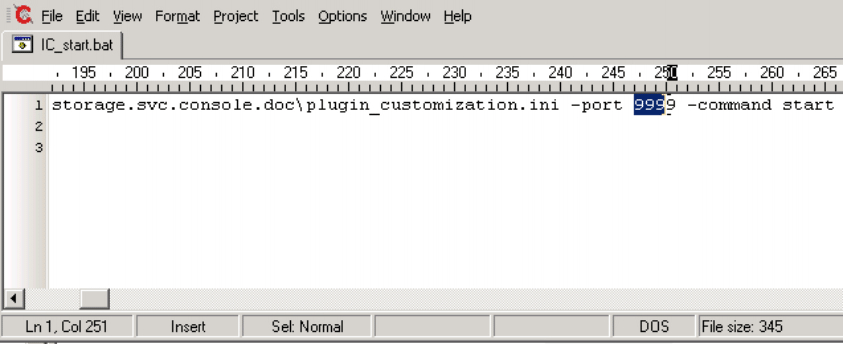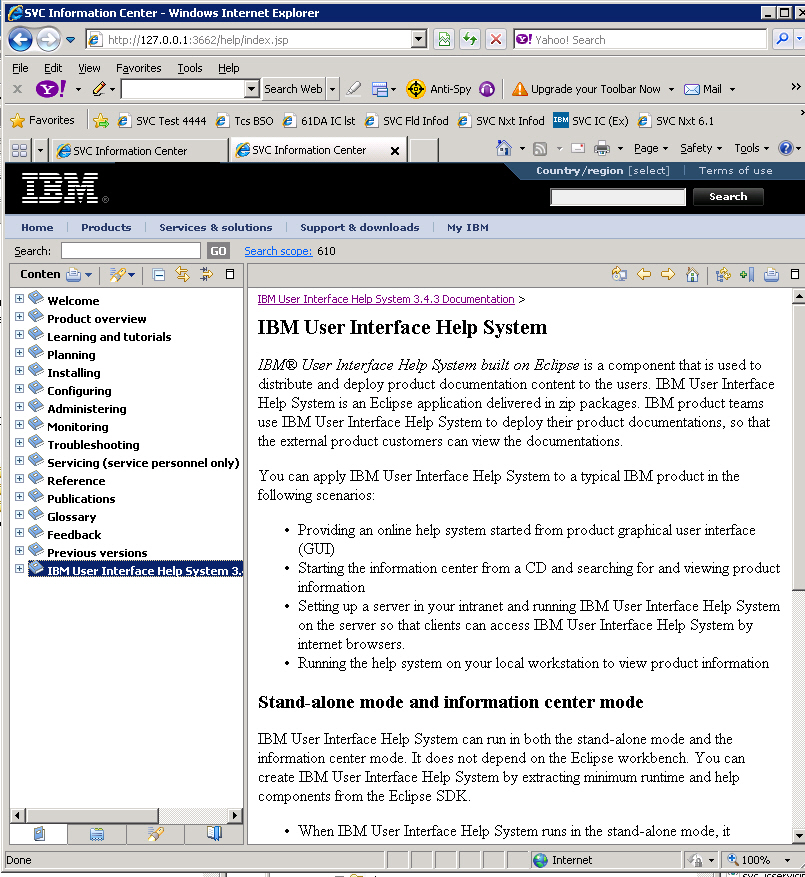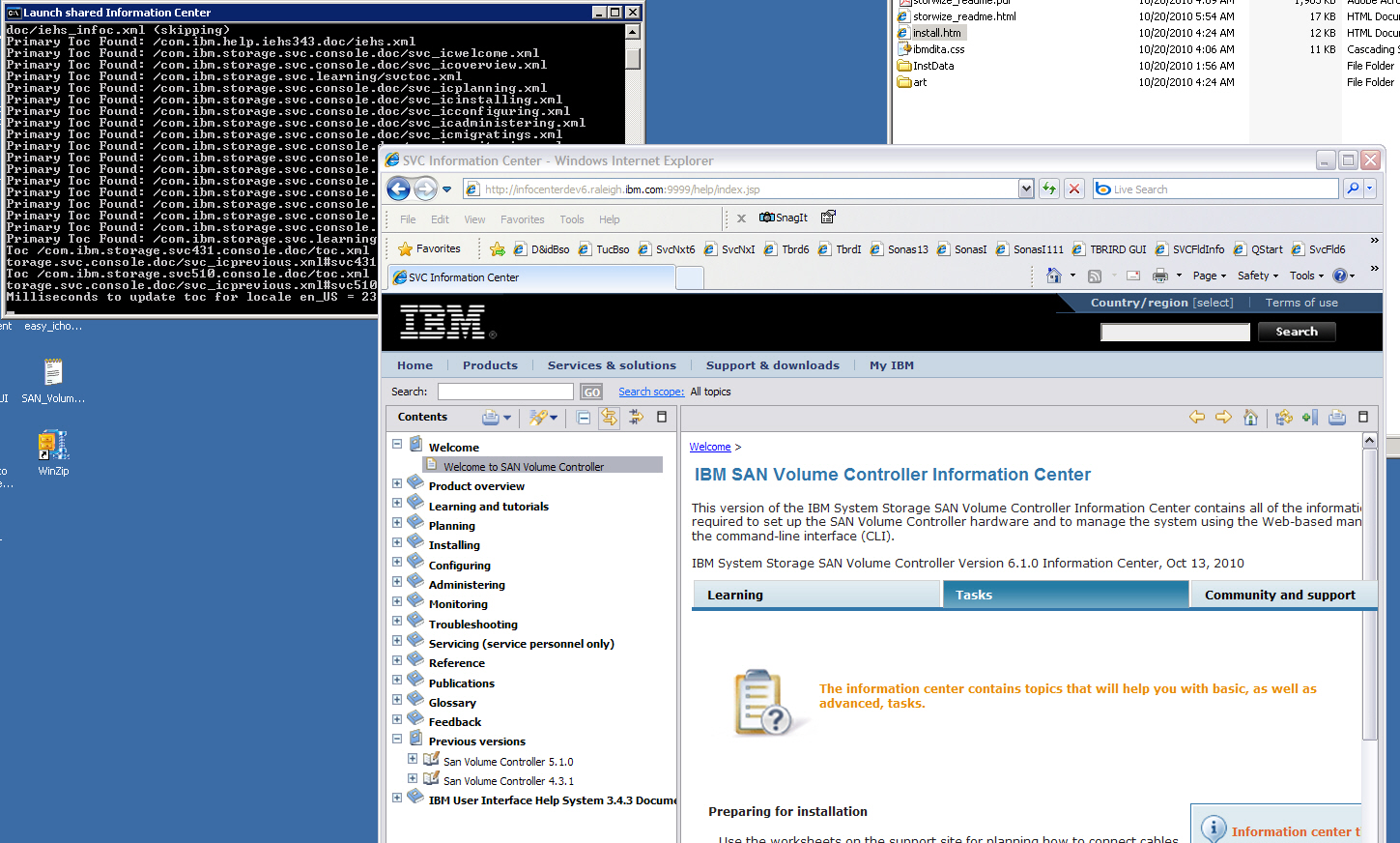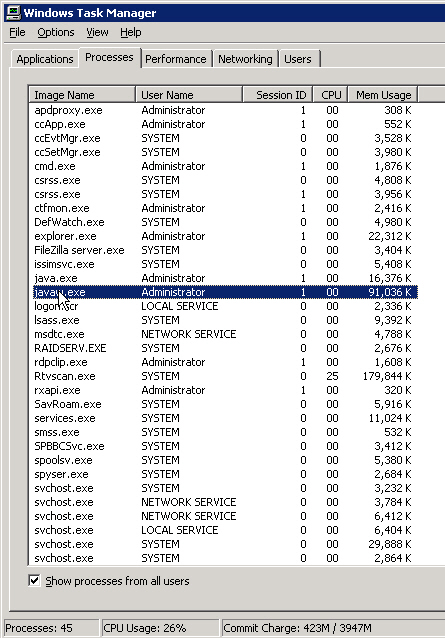This document describes how to install and use the Information
Center and the PDFs that the SAN Volume Controller web installation
program creates on your hard drive.
About this task
Click on the web installation program for SAN Volume Controller
to open a download panel.
You might have to locate the panel if it opens behind
your other windows.
Tip for Mozilla users: You will
likely have to download the file and then click it in the download
list that Mozilla maintains, to continue the rest of the installation.
Internet Explorer provides the Run option, but still waits for the
file to download before initiating the rest of the installation.
You
can save the code, or click
Run to get started
installing the SAN Volume Controller Information Center. After verifying
the publisher, a download panel is displayed.
After downloading the code, which is approximately 500
MB of data mainly for the IBM User Interface Help System built on
Eclipse 3.4.3, a panel is displayed for you to manage the installation
instance. Click
Install a new instance.
The default installation directory is the C:\Program
Files\SVC 6.1.0 IC directory. This document refers to the
disk drive and directory where you choose to install the Information
Center as the installation_root_directory in some
examples.
- Accept the license terms to continue by clicking Next.
- When the Installation utility opens, click Next to
continue.
- Choose an installation location; then click Next.
- Choose a new Program Group (the default) or select a method
of accessing the start options for the Information Center.
By
default, the Program Group is "SAN Volume Controller 6.1.0 IC".
- Review the selections you have made, then click Install.
The SAN Volume Controller Information Center requires approximately
1 GB of free space, primarily because of the size of the IBM User
Interface Help System built on Eclipse 3.4.3.
The information
center plug-in for the SAN Volume Controller Information Center is
approximately 20 MB. There are two previous versions in the SAN Volume
Controller Information Center. The 5.1.0 version requires approximately
20 MB. The 4.3.1 version requires approximately 20 MB. The size of
the e-Learning Flash modules that you access through the Information
Center is approximately 100 MB. The size of the PDFs directory that
the installation program installs is approximately 70 MB.
- As the installation proceeds, you can see it unpack a compressed
file that includes all the data.
A progress bar at the bottom of the window indicates how
far along the installation is. The PDFs are installed in the PDFs
folder in the installation root directory.
An uninstall program
is created and provided as a menu selection on the Start menu. The
InstallAnywhere program names the uninstaller
"Change SAN Volume
Controller 6.1.0 IC installation.exe". The uninstaller is the last
component to install.
A successful completion panel is displayed after all
the code is installed.
Two ways of accessing the SAN Volume Controller Installation
Center exist:
- Stand-alone mode which is ideal for a laptop and personal use
- Information center mode, which is referred to as shared mode in
this document and in the Start menu
Information Center mode is ideal for a server that everyone
in a company might access. The SAN Volume Controller Information Center
has more information about each mode.
Stand-alone mode opens
the SAN Volume Controller Information Center automatically in a browser
window by using a loopback port and web address.
Access the
shared-mode Information Center by entering the web address of the
Information Center into a browser window. The default for the SAN
Volume Controller Information Center is this address:
http://server_name_or_IP:9999/help/index.jsp
The
port is 9999, which a later step shows how to change, if necessary.
You
can view the PDFs directly without going through the Start menu by
changing directories to the PDFs directory in the installation root
directory and clicking the start.html file.
The
Start menu has options for SAN Volume Controller 6.1.0 IC to perform
these tasks:
The page that opens when you select to view a PDF is
a simple HTML page that is not part of the Information Center. Simply
close the page when you are done.
- Click Done on the Installation Program
window to close the program.
- Click to access the options.
- To start the Information Center, edit the installation_root_directory\Storwize
6.1.0 IC\storwizeic\IC_start.bat file
to change the port from 9999 to a port that
works for your workstation or server.
To edit the port,
open the installation_root_directory\Storwize
6.1.0 IC\storwizeic\IC_start.bat file in a flat-file editor.
- The batch file is a long command string. Search for 9999,
which is the default port. Change it to a port that works for your
organization and save the file.
- Double-click the IC_start.bat command
file directly to start the SAN Volume Controller Information Center,
or select it from the Start menu.
You can start the
Information Center immediately on port 9999. Or you can edit the port.
To
stop the Information Center, double-click the IC_end.bat command
file directly, or select it from the Start menu.
- Anyone who can access the server or workstation by its
IP address or fully qualified DNS name can access the Information
Center at the http://server_name_or_IP:9999/help/index.jsp web
address.
- If you changed the port number, access the information
center using the following information from the IBM User Interface
Help System built on Eclipse 3.4.3:
- Open the browser in which you want to run the information
center.
- Enter the following syntax as the web address:
http://server_name_where_you_installed:port/help
For
example, if you installed the Information Center on server_abc,
using port 3737, your web address is: http://server_abc:3737/help
- After typing the web address in the browser, press Enter to
access the Information Center.
- After the Information Center starts, you can find more
information about stopping, starting, and using the Information Center
in the information container that is labeled IBM User Interface Help System
3.4.3 Documentation.
This set of topics describes these items:
- Starting and stopping the help system in stand-alone mode, which
is how you might do it when you want to run the Information Center
just for yourself
- Starting and stopping the help system in information-center mode,
which is how you do it on a server that you want many people to be
able to access
- Navigating in the help system
- Searching in the help system
- Printing in the help system
- Accessibility and keyboard shortcuts in the help system
- Troubleshooting, although some of the topics are for an IBM service
representative
- Building your help system, in case you want to use open source
DITA or HTML to add your own documentation plug-in to the Information
Center
- As someone accesses a shared Information Center instance
for the first time, the command window shows Eclipse loading the TOC
XML files, and the Information Center is displayed in the user's
browser.
The IBM User Interface Help System runs under an Eclipse
javaw instance. When you stop the shared Information Center, the Eclipse
instance is ended. Sometimes, Eclipse leaves a javaw instance running
after you end it from the Start menu.
Troubleshoting tip: If you stop an Information
Center instance, then later, cannot start the Information Center in
a new instance, the reason is probably that the original javaw instance
never ended.
If you have a stubborn javaw instance, open the Task
Manager with Ctrl-Alt-Del to view processes. Sort them alphabetically
and select a javaw instance to stop. Unfortunately, there is no way
to determine which javaw instance to end. You can always restart any
Java programs that you inadvertently shut down.
- You can end the stand-alone SAN Volume Controller Information
Center javaw instance by selecting Stop the stand-alone
IC from the Start menu.
- Uninstall the entire SAN Volume Controller Information
Center when you uninstall.
The installation program
leaves a series of files that Eclipse created when the information
center was started for the first time. You must manually delete these
files.
